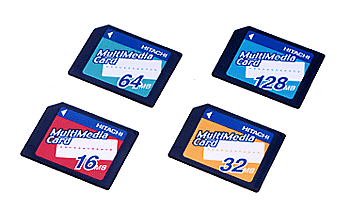|
 |
DOWNLOAD |
|
Hitachi Releases High-Speed MultiMediaCardTM
Series Achieving Industry's
Top-Level Write Speeds |
-- The 128/64/32/16-Mbyte product lineup offer
write speeds approximately 3 or 6 times
as fast as existing Hitachi MultiMediaCards -- |
 |
| High-Speed MultiMediaCardTM
Series |
|
| |
Tokyo, September 10, 2001 Hitachi, Ltd. (TSE: 6501) today announced
the high-speed MultiMediaCardTM*1
series, offering the industry's top-level write speeds, for use as flash
cards in products such as digital cameras and portable music players.
Sample shipments will begin in 11 September 2001 in Japan for the 64/32/16-Mbyte
products and 10 October 2001 for the 128-Mbyte product.
 128
Mbytes: HB28B128MM2, 2.0 Mbyte/second write speed 128
Mbytes: HB28B128MM2, 2.0 Mbyte/second write speed |
 64
Mbytes: HB28D064MM2, 2.0 Mbyte/second write speed 64
Mbytes: HB28D064MM2, 2.0 Mbyte/second write speed |
 32
Mbytes: HB28D032MM2, 1.0 Mbyte/second write speed 32
Mbytes: HB28D032MM2, 1.0 Mbyte/second write speed |
 16
Mbytes: HB28E016MM2, 1.0 Mbyte/second write speed 16
Mbytes: HB28E016MM2, 1.0 Mbyte/second write speed |
* The write speed is the write time for the card itself,
and does not include processing time in the player.
The products in this series offer write times approximately 3 or 6 times
as fast as existing Hitachi MultiMediaCard s, and are also the industry's
first products to conform to the System Specification Version 3.1 specifications
standardized in June of this year by the MMCA (MultiMediaCard Association),
the MultiMediaCard standardization body. Multiblock writes are possible
with interfaces widely used in the market, and in SPI mode, enabling
higher speeds to be achieved.
[Background]
Flash MultiMediaCards are the smallest and lightest flash cards currently
available on the market, and because of their ease of use are widely
used in devices such as digital cameras, mobile phones, PDAs, and portable
music players. Demand for these cards is expected to continue to grow
in the future. Hitachi currently has 64-, 32-, and 16-Mbyte MultiMediaCards
in mass production, and has developed a 128-Mbyte model, but the need
to raise imaging speeds as digital camera pixel counts increase, and
to speed up music storage on cards in music players, has brought a demand
for faster card write speeds. To meet this demand, Hitachi has now developed
the High-Speed MultiMediaCard Series.
[About these Products]
This high-speed series offers the following features.
| 1. |
Industry's top-level write speeds
The use of newly developed high-speed flash memory together with
improvements in controller write logic, plus the use of interleaving*2
in the 128- and 64-Mbyte models, has made it possible to achieve
write speeds of 2.0 Mbytes/second* for the 128-/64-Mbyte models
(approximately 6 times as fast as the 350-Kbytes/second* of Hitachi's
current models), and 1.0 Mbyte/second* for the 32-/16-Mbyte models
(approximately 3 times as fast as the 350-Kbytes/second* of Hitachi's
existing models). As a result, with a 128/64-Mbyte card, for example,
the previous 1.5 second* write time for around 500 Kbytes of image
data in a 3-million-pixel class digital camera has been reduced
to a mere 0.25 seconds*, while the previous 5 to 6 minutes* required
for the data of one music track has been reduced to just 1 minute*,
making it possible to write to individual cards.
(* Write time for the card itself, not including processing time
in the player) |
|
| 2. |
Industry's first products conforming to MMCA's System
Specification Version 3.1 specifications
Multiblock write was previously only possible in MultiMediaCard
mode, but in line with the System Specification Version 3.1 specifications
released in June of this year, can now also be used in SPI mode.
This allows high-speed data writing. |
The label design is a new design projecting an image of high-speed performance,
enabling the new products to be distinguished from current ones.
[Support Tools]
Support tools for use when designing a system using MultiMediaCards
are available from third-party suppliers, including driver, file manager,
and other software*3, hardware such as an H8S
microcomputer-based development platform, and also analytical tools
such as a dedicated MultiMediaCard protocol analyzer*4.
| Notes: |
1. |
MultiMediaCard is a trademark of Infineon Technologies
AG of Germany, and is licensed to the MMCA (MultiMediaCard Association).
Hitachi is an MMCA board member.
http://www.mmca.org/ |
| |
2. |
Interleaving refers to the simultaneous writing
of two or more flash memories. By performing parallel writing
it is possible to approximately double the write speed. |
| |
3. |
Driver and file manager software is marketed by
AI Corporation in Japan. |
| |
4. |
An H8S microcomputer-based development platform
and dedicated MultiMediaCard protocol analyzer are marketed by
KOKUSAI ELECTRIC ALPHA CO., LTD. |
< Typical Applications >
 |
Portable imaging products such as digital video
cameras and digital cameras |
|
 |
Handheld PCs, palm-size PCs, PDAs, electronic organizers,
and similar portable information devices |
|
 |
Mobile phones with music download/playback functions,
portable music players, toys, game machines, |
|
and similar portable entertainment products |
|
 |
Smart phones, pagers |
< Prices in Japan > (For Reference)

< Specifications >

* The write speed is the write time for card itself, and does not include
processing time in the player. |


WRITTEN BY Corporate Communications Division
 |
|

